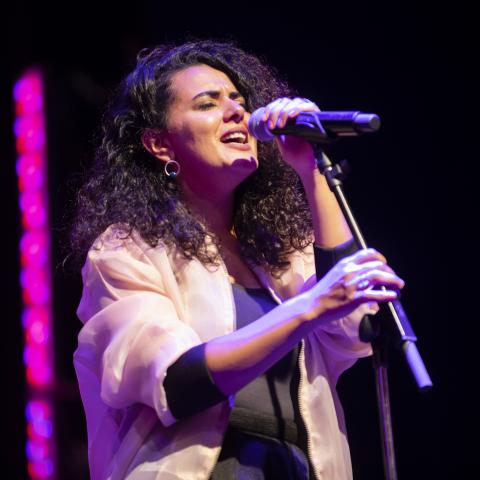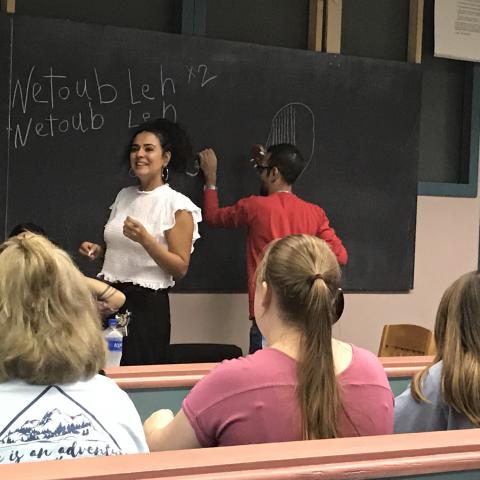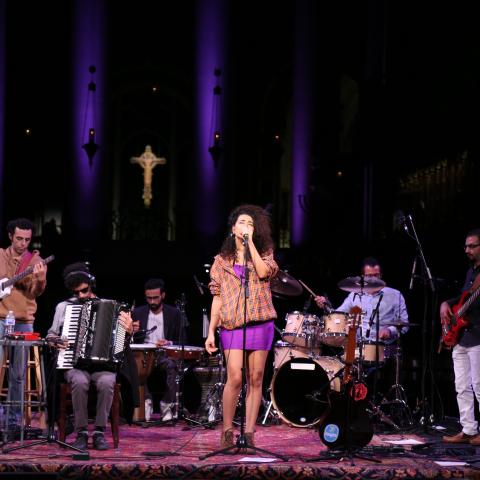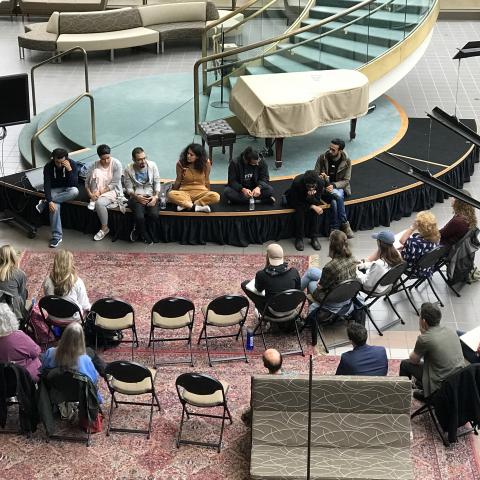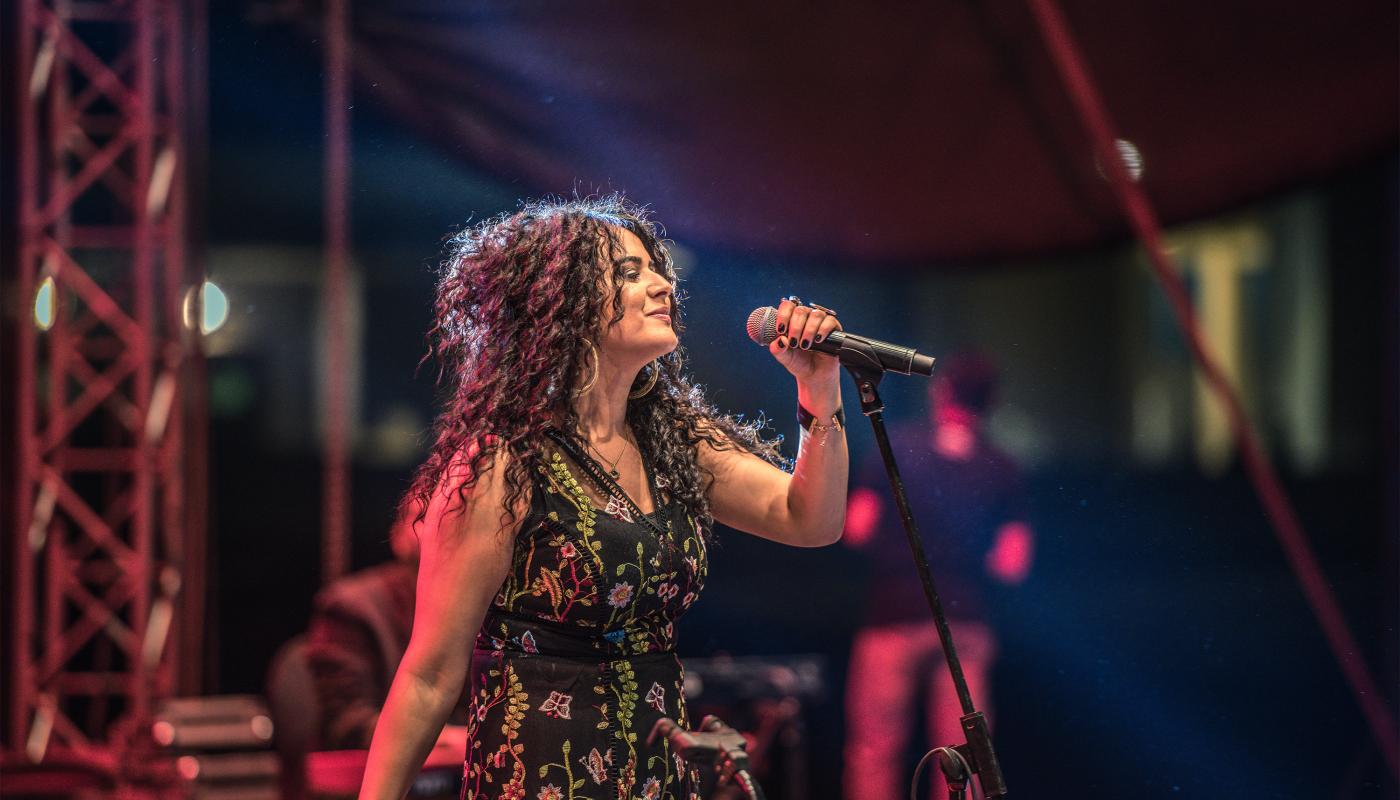
Dina El Wedidi


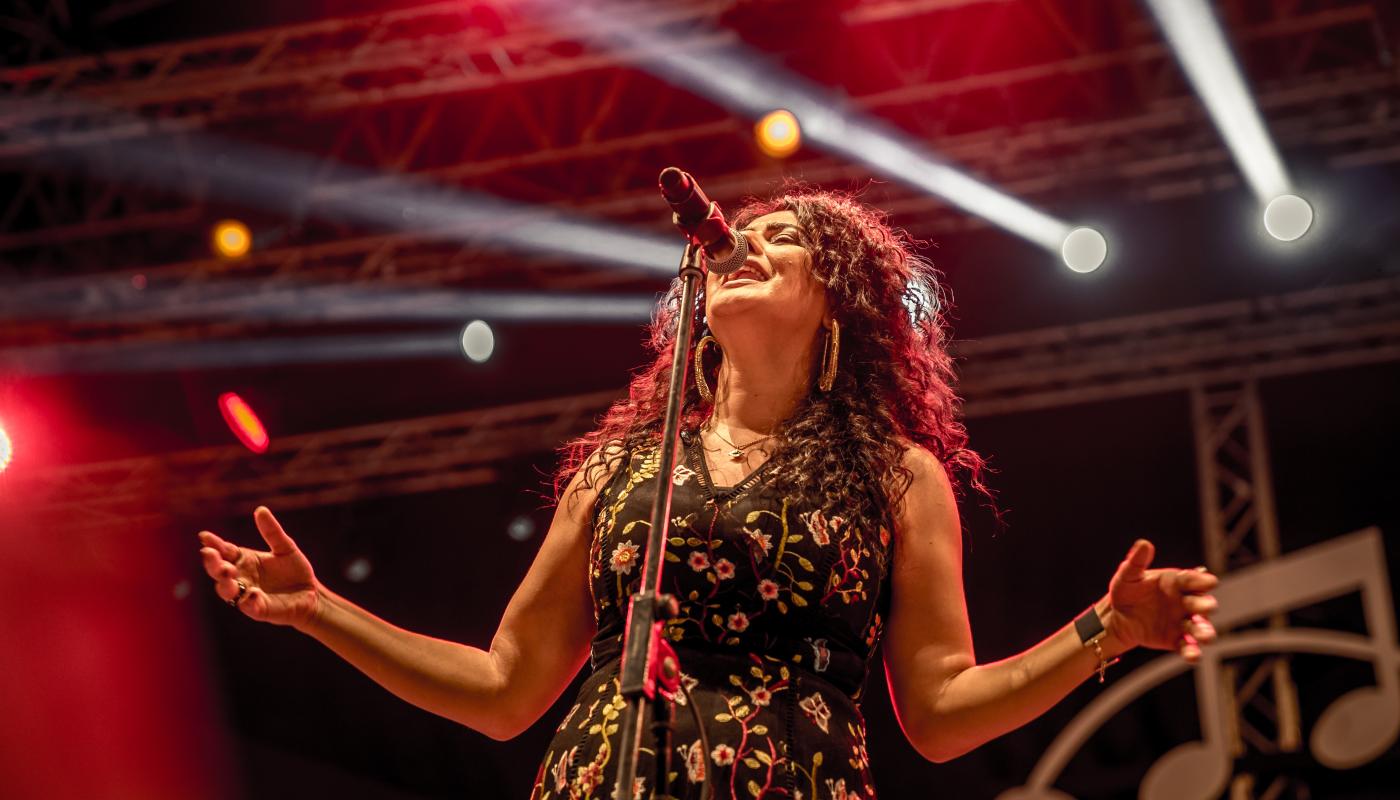


Dina El Wedidi
A sophisticated and compelling musical innovator of Egyptian heritage and contemporary identity.
Dina El Wedidi channels the heritage and contemporary identity of Cairo to deliver “transcendent performances.” (Al-Ahram) A sophisticated musical innovator, her richly ornamented and detailed compositions, generous arrangements, bell-clear voice, and charismatic stage presence have established her as a global cultural force.
“Dina is a huge talent. Her voice is captivating and irresistible. There is a fierce personal-political thread through her music that opens a space for a future otherwise unable to be born.” (Peter Sellars)
With sophisticated musical hybridity, “El Wedidi’s songs reflect different temperaments and styles, from jazz to folk and underground rock, a combination of instruments and sounds that can’t be labeled under one category. She is shaping a new musical genre that has emerged in the wake of the Tahrir Square Revolution.” (Euro News)
“When I want to sing about something, I do. The reality is that ‘the street’ talks about many things, and I’m inspired by the people on the street, from a personal level to the political.”
Dina El Wedidi
tour overview
Washington, DC - September 15-18
- Dina El Wedidi kicked off their tour in Washington, DC with a shared performance at Tropicalia with fellow Center Stage band Youssra El Hawary on September 15, hosted by Multiflora Productions.
- Egyptian journalist Nourhan Magdi wrote about the performance on the 15th in Egypt Today with an article titled, "Breathtaking Night in Washington with Dina El Wedidi and Youssra El Hawary"
- After a welcome by the State Department, rehearsal time, and sightseeing, the group performed at the Kennedy Center Millennium Stage on September 17th. You can watch the performance here.
Richmond, va - September 19-20
- During several days in Virginia at the Modlin Center at the University of Richmond, the band jammed with local musicians at Black Iris, visited an Anthropology of Music Class, and performed on September 20th with a post-show Q&A.
Lewisburg, PA - September 24-27
- Dina El Wedidi's residency at Bucknell University, hosted by the Weis Center, included several visits to classes such as Taboos in the Arab World, Arts Entrepreneurship, and Beginning Arabic. A hosted lunch with the Intro to Women's Studies class and a welcome dinner with faculty and staff filled out the rest of their time at the University.
- The group performed at the Weis Center on September 27th.
New York City, NY - September 28-October 1
- Several days in New York City centered around an incredible performance at the Cathedral of St. John the Divine on September 29th. For photos and a write up of the performance, read Nourhan Magdi's piece in Egypt Today.
Burlington, VT - October 2-3
- Headed north for their first stop in New England, Dina El Wedidi performed at Higher Ground on October 3rd, co-hosted by the Flynn Center for the Performing Arts.
Boston, MA - October 4-7
- The group spent several days in Boston hosted by Boston University's Arts Initiative. They held a workshop/demonstration with students titled "Translating Egyptian Music for Global Audiences" while on campus.
- On October 6th they performed during the University's Inaugural Global Music Festival.
- Before heading out of town, band members attended Somerville's iconic Honk! Fest.
Austin, TX - October 8-12
- Making their way to Texas, Dina El Wedidi spent a week in Austin hosted by WoBeon.
- The band performed at KUTX's iconic studio, had a class visit with UT Butler School of Music students that included a "group sing" to learn some of Dina's songs, and attended several hosted dinners and jam sessions.
- The band rounded out their time in Texas with performances on October 10th and 11th at One2One Bar.
West Palm Beach, FL - October 13-18
- For the last stop on their Center Stage tour, the group spent several days in West Palm Beach hosted by the Kravis Center for the Performing Arts.
- The band held a workshop for Advanced Choir middle school students and held an afternoon performance for school kids.
- Their last performance was at the Rinker Playhouse on October 18th.
program notes
Dina El Wedidi
Cairo, Egypt
Dina El Wedidi...Band Leader, Vocals
Ra'fat..................Drums
Azeema..............Percussion
Mouner...............Bass Guitar
Sherif..................Electric Guitar
Wael....................Accordion
Balqeis...............Oud
Since she burst onto the scene with her powerful voice and inventive but rooted style, Dina El Wedidi has become a well-loved name in Egyptian contemporary music, driven by a curiosity and a propensity to shed her skin and venture down new paths.
She draws deep into her musical roots of performing Egyptian folkloric music with the Warsha Theater Troupe and Habaybena band, filtering this through her talent and love for experimentation, to produce music that is familiar and relatable for Egyptians, but at the same time presents her own understanding of it. Her participation in these projects inevitably led her to write her own music, and in 2011, she took the fundamental next step in her career and formed her own band; from here her success has soared, not only gaining her stardom in Egypt, but a fan base internationally.
Starting in 2012, Dina joined The Nile Project. Her experience collaborating with musicians from 11 East African countries blasted open her musical universe, and since then she has incorporated elements of these cultures, specifically Ethiopian, into her music. She is featured on the first two Nile Project albums, Aswan (2013) and Jinja (2014).
That same year, she was selected by Gilberto Gil and the Rolex Mentor and Protégé Arts Initiative as a protégé. In 2014, Dina released her debut album Turning Back (Tedawar W’Tergaa), which she labelled as New Arab Folk.
Over the past couple of years, Dina has gone down a very different artistic track, figuratively and literally, straying heavily from the tried and true recipe that earned her success. Largely, this involved delving into production to expand her skills beyond singing and songwriting. This path also introduced another new, and even less orthodox instrument to Dina: trains.
For this new work, she had to dig into uncharted territory and relearn her creative process. Manam is an experimental electronic album, produced from layers of processed train sounds, over which she sings. The result is a 30-minute voyage, a short nap crossing seven stations, in which Dina tells hallucinatory stories.
Music Lyrics
Album: Dina El Wedidi - Turning Back
1. Fi Belad El Agayeb (In Wonderland)
In wonderland, in wonderland mate
And we hear the tales, mate. And we took the first steps, mate
The tales distracted us, And steps betrayed us
In wonderland, look
In the voice that is lost and stifled
And the boy who sought and did not find
In the worry that wonders laughing
And the Nile that took off and did not offer a drink
In wonderland mate, in wonderland, look
They told me dust is like diamonds, I carried dust on my head
Dust sold me to the drink, People wondered about my state
In wonderland mate, in wonderland, look
Oh gaping well of self, Oh foot, and we are forced to go
In wonderland mate, In wonderland, look
2. El Haram (Sin)
Sin is sin, vendor of words
Singing is not a sin
Love is not a sin
Sin is manipulating words into lies
Sin is sin, vendor of words
Art is not a sin
Feeling is not a sin
Sin is the words,
half of which are lies
3. Dawayer (Circles)
I know you are not lost and do not know where
the road, the place, the truth are
But there is something bold and innocent
And could nest in gentle hearts
Oh hoping, confused, walking in circles
You who is sleeping and awake in all beds
Return to your origin and see who formed you
This is your sun, your land, the origin of
origins, the sun and the seasons
Oh hoping, confused, walking in circle
You who is sleeping and awake in all beds
4. Ya Belad (Homeland)
Oh lands we have left you, my tears ran dry
Oh lands you were our hope, and one day it woke up and vanished
The raven cowed unto our hope, shattered walls and homes,
I wish our eyes had gone, and our lands lingered
Oh lands we have left you, my teaes ean dry
Oh lands you were our hope, and one day it woke up and vanished
Adorn his body with what we have, we are captives and people are gone
Adorn his body with what they have left, they have wrecked our land and killed the child
I've dreamt of carrying a home and my tears flow
And suddenly the home is a night crying until my years drown
Oh lands we have left you and my tears ran dry
Oh lands you were our hope, And one day it woke up and vanished
5. El Sira
Al Sira Al Hilalia is an Arab epic covering a large historic timeframe and portraying the life of the Bani Hilal clan. It consists of one million verses and branches off into several stories. AlKhafagi Amer, is one of Al Sira's heros. This song, sang for a long time as part of the Egyptian folklore, is taken from one of many parts speaking of him.
6. Yohadethoni El Shagar (Trees Address Me)
Trees address me, Seasons talk to me
About a face I lost and still love
How I stayed up and dreamt to tell you,
sweetheart, that I will not fall in love again
My shirt is still the same and the cold is still
the same and feasts come and the year is as it always was
My sweetheart in his gentleness, revered the winter.
Winter has left but I can not leave like it.
7. El Leil (The Night)
Night precedes the shivers of the cold
And the world rains roses on his forehead
People meet each other with embraces
Others say goodbye to their embrace, delirious
The smell of the past hang on the edge of my ballad
The smell of the past, the smell of who was precious
Ya leil, ya Ein, Oh sun with no rise
Ya leil, ya Ein, you area piece of my mind
Staying up waiting for the late morning
Waiting to see the first comers
You draw near, praying and lighting incense
The precious is gone here is its buyer, dead
8. Hozn El Ganoub (The Grief of the South)
If our souls had been washed by breeze and not wind
If we had held the honey before the honey ran
If they had left matters to naturally form for real
Oh my South... my South
Maybe worry wouldn't have filled the hearts and eyes
Maybe pain would not have nested towards the south
My love, my land, I asked you, barely able
How do we gather pain and ease the grief of the South
If they had left the children to empty the jubilance from fear
We would've been guided, mate, and understood at ease
And learnt from horrors how to stop escaping,
how to gather pain and relieve the grief of the south
Oh my South... my South
9. Tedawar W'Tergaa (Turning Back)
And turn back in pain and recluse
And the gaunt years crash upon you
And when you find your love it leaves you
And as soon as your love leaves you, you fear
You made your prison out of air and entered it willingly
And offered yourself to your love not asking where he kept you
And because all have hurt you, you decided to love and angel
You who have loved an angel, even the angel snubbed you
10. Kotr El Wagaa (The Ardor of Love)
The ardor of love is great, But too much hope is naive,
I was kind to you so you took advantage, And you leeched on the kindness
Yes my heart has loved you, and love is not a shame
I got lost in your love and endured, I got lost in your love and endured
You used to call and I would come, Spilling your heart out to each other
I stay up all night with you, in burden I carry you
Too much cruelty and blame, Is no the nature of lovers
I got lost in your love and endured, I got lost in your love and endured
I don't deny I miss you, I thought of writing to you
But I remembered that you, Had been foolish too many times
And my heart is not a give away, I got lost in your love and endured
11. Sokoun (Stillness)
You who knows everything that stifles you
You who in life is unjust to yourself
You who finds time countering you
Curse your worries...
Shake the dust of memories off your clothes
And declare that what killed you, were your venoms
And return to the same quiet, gratified in your stillness.
See the entire CD Booklet here:
background
The Voice of Ardor: Dina El Wedidi’s Incisive Songs and Incandescent Performance
Sometimes an artist comes out of the blue and resonates globally. Singer Dina El Wedidi is one of those voices. Establishing herself as a bandleader, songwriter, instrumentalist, and stunning singer, she is building a career based on innovation and challenge.
“I believe I have the freedom to talk about anything in my music,” says El Wedidi. “When I want to sing about something, I do. The reality is that ‘the street’ talks about many things, and I’m inspired by the people on the street.”
El Wedidi links traditional motifs and ideas to build layered works of contemporary hybridity. In form, content, and expression, she creatively tracks Egypt’s storied past and contemporary circumstances. Her original songs draw on folklore, rituals, and early 20th-century popular music, as well as global ideas and exploration. With a sophisticated sense for admixture and contrast, backed by guitar, bass, accordion, drums, ney, and keys, “El Wedidi’s songs reflect different temperaments and styles, from jazz to folk and underground rock, a combination of instruments and sounds that can’t be labeled under one category.” (Euro News)
U.S. Tour in 2018
Dina El Wedidi and her band join four other ensembles from Egypt and Ukraine that will make independent tours of the U.S. from July-December in 2018 as part of Center Stage, a cultural exchange program that invites performing artists from abroad to the United States to perform, meet, and share their experiences with communities around the country. Her fall 2018 tour is being scheduled now.
Called “transcendent” by the Egyptian press (Al-AhRam), El Wedidi’s prowess and intensity on stage is backed by some of Egypt’s best young musicians. She has toured on her own in Europe and the U.S., and toured with, written for, and recorded with the multi-national supergroup that forms the Nile Project. She was mentored and toured with international icon Gilberto Gil as a Rolex protege. The cumulative impact is propelling Egypt’s modern music scene into international prominence.
“Dina is a huge talent. Her voice is captivating and irresistible,” explains theater director and festival curator Peter Sellars, who invited El Wedidi for the 2016 Ojai Festival. “There is a fierce personal-political thread through her music that opens a space for a future otherwise unable to be born.”
El Wedidi began spinning this thread early on, in her own striking way. As a child, she constantly made up little ditties and songs though she never really thought much of it. She earned her university degree in Persian and Turkish studies, and worked as an interpreter at the Turkish Embassy in Cairo. Then she auditioned for and joined El Warsha, a theater group led by Maged Soliman that incorporated songs into its performances.
There she learned about music from Upper Egypt, from the Cairo of a century ago. “When I came to him, I could barely carry a tune,” she recalls. “He taught us traditional songs, comic monologues from the ‘20s and ‘30s, Arab classical music. We also talked about the context, the way people are living in Upper Egypt, for example. I spent three years with El Warsha, figuring out how to tell stories, how to sing, how to move on stage.” Her skill shines through on songs like “Ardor of Love,” in which El Wedidi incorporates cheeky theatrical moments and homages to cheeky early 20th-century tunes, layered with the ornate, twirling keyboards of contemporary Egyptian pop.
El Wedidi began to think of herself as a musician, as a potential songwriter. “I started to follow the music scene,” remembers El Wedidi. “I’d go to every concert I could, I was curious about everything that was happening.” She took workshops by Grammy-winning artist Fathy Salama, whose approach prodded all participants to start composing melodies and writing lyrics, and with Palestinian instrumentalist-songwriter, Kamilya Jubran. El Wedidi began working on her own original pieces. A producer and musician friend, violinist Nancy Munir, urged her to start her own band.
She picked up on singing styles and unusual folk instruments, on jazz savvy and pop bounce, melding them with seemingly effortless glee into single tracks. She wove new rhythms into her songs, “rhythms that don’t usually appear in Egyptian music,” she explains. The sounds and lives around her found their ways into her work, and she found her bold, nimble voice.
The project became an underground hit, then quickly gathered critical and popular strength at home and abroad. El Wedidi drew the attention of the Rolex Mentors and Proteges Arts Initiative, and Brazilian icon Gilberto Gil took her under his wing. “I traveled with him, watched him on stage and backstage,” El Wedidi says. “Eventually we performed together. He gave me a lot of support and advice about Turning Back, my first album,” singing a cameo on one track.
“After I finished my mentorship, I asked if I could compose a song for him.” Next, El Wedidi tapped a guitarist she met in Bahia at Carnival. “The track, ‘The Night,’ was just the three of us. Gil loved it. He started to write his own lyrics for it. I traveled to Brazil to record it in Gil’s studio.”
El Wedidi’s songs on Turning Back album take a striking perspective on Egypt’s musical worlds. She harnesses the potent, buzzy drone of the iarghul, a rare reed instrument from Upper Egypt El Wedidi learned to play. In “Circles,” a stunning statement about battling depression, she turned to a Cairene group of women who still perform the zār, a ritual associated with restoring mental balance through song. “It’s a practice that is disappearing,” notes El Wedidi. “I asked them to collaborate with me, and they were open to do that. They were my mentors. They got us into the trance.”
The work she did with Gil and the Nile Project, and the songs captured on her first album engage, directly and indirectly, in social and political commentary through a personal lens, and El Wedidi is intensifying her focus. “I have always picked lyrics that I love, that move me and reach the soul,” she reflects. “Recently, I’ve been drawn to lyrics written about personal experiences that speak to problems and ideas I have also dealt with in my own life.” As El Wedidi continues to explore the intersections -- of the personal and political, of home and the other, of Arabic and African musics, she is inviting us to join her in new spaces, spaces open to all.
About Center Stage
Center Stage is a public diplomacy initiative of the U.S. Department of State's Bureau of Educational and Cultural Affairs, administered by the New England Foundation for the Arts. From June-December 2018, Center Stage will tour five ensembles from Egypt and Ukraine in the U.S. These are Dina El Wedidi (Giza, Egypt), Kurbasy (Lviv, Ukraine), Mohamed Abozekry & Karkadé (Cairo, Egypt), Teatr-Pralnia with CCA Dakh (Kyiv, Ukraine), and Youssra El Hawary (Cairo, Egypt).
Now in its fourth season, by the end of 2018, 29 performing arts ensembles from nine nations -- Algeria, Egypt, Haiti, Indonesia, Morocco, Pakistan, Tanzania, Ukraine, and Vietnam -- will have toured from coast to coast, hosted by colleges and universities, festivals, music clubs, and cultural centers. Each tour includes residencies in large cities and small towns, and a range of activities from performances, workshops, and discussions, to artist-to-artist exchanges, masterclasses, and community gatherings. Center Stage artists engage with audiences onstage and online sharing their work with audiences in the U.S. and friends and fans at home to build mutual understanding through shared cultures and values.
Center Stage is made possible in cooperation with the U.S. Regional Arts Organizations, and with support from the Doris Duke Foundation for Islamic Art, and the Trust for Mutual Understanding. General management is provided by Lisa Booth Management, Inc.
Press
- PRIs the World, Audio Interview: Egyptian pop star Dina El Wedidi
- Egypt Today: Dina El-Wedidi lights up stage at St. John Cathedral in New York
- Norient: Learning from Feminism
- KUTX, Studio Recording: From the Vault: Dina El Wedidi
- The Daily Californian: Dina El Wedidi, company impress with transcendent performance at Zellerbach Hall
- Cairo Scene: How Dina El Wedidi captures Egyptian culture in a song
- Ahram Online: Cultural fusion with Dina El Wedidi, Mazaher and Chelsey Green at Cairo's Citadel
audio clips
Listen to these Dina El Wedidi tracks via Soundcloud:
Downloadable photos, billing & crediting information
Credit Info
The following credit is required on the title page in all printed performance programs. We appreciate its use wherever else it's practical: brochures, posters, ensemble-only promotional materials, press releases, advertisements, etc:
The presentation of Dina El Wedidi is part of Center Stage, a public diplomacy initiative of the U.S. Department of State's Bureau of Educational and Cultural Affairs, administered by the New England Foundation for the Arts in cooperation with the U.S. Regional Arts Organizations, with support from the Doris Duke Foundation for Islamic Art, and the Trust for Mutual Understanding. General management is provided by Lisa Booth Management, Inc.
Center Stage logo placement is greatly appreciated. On web-based materials, please link from the Center Stage logo or written name to www.centerstageUS.org.
Download a zipped folder with high resolution promotional photos and color and black and white versions of the Center Stage logo at the link below.
